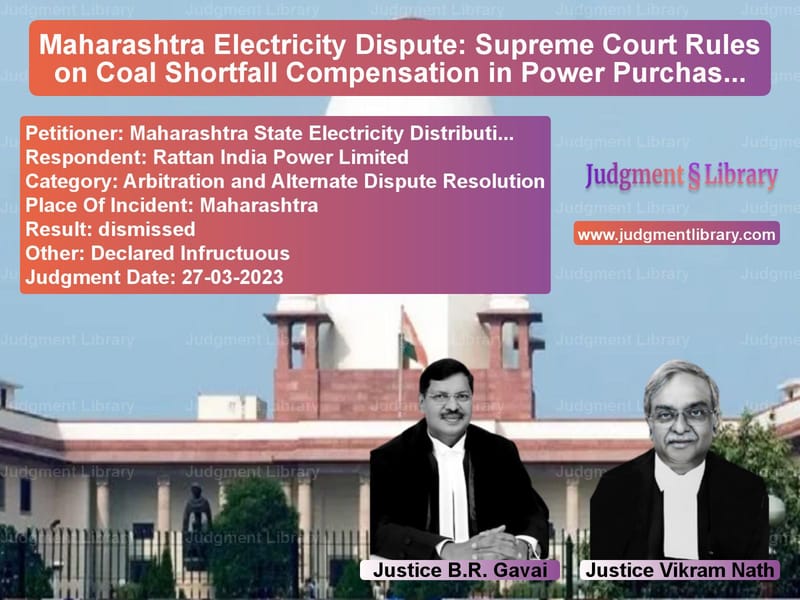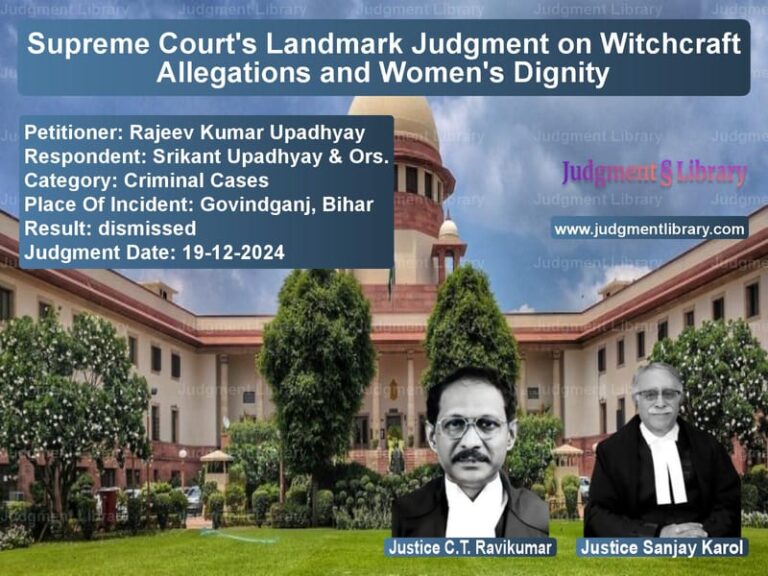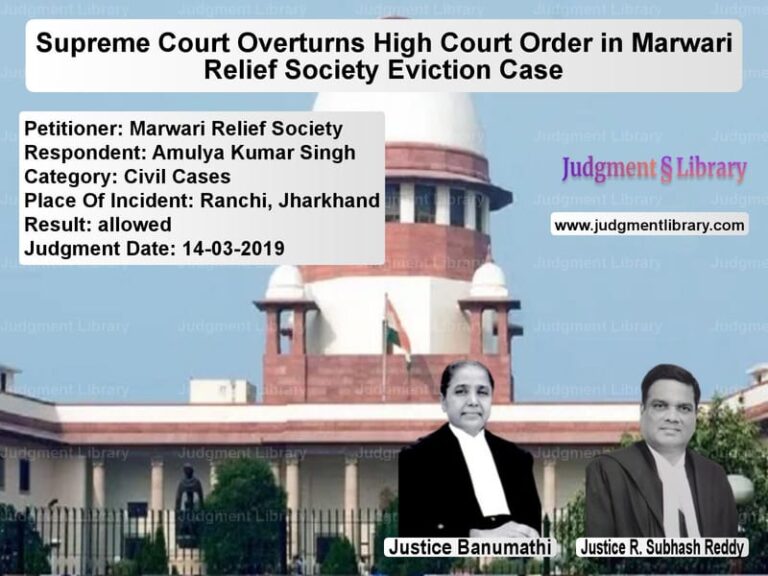Maharashtra Electricity Dispute: Supreme Court Rules on Coal Shortfall Compensation in Power Purchase Agreements
The case of Maharashtra State Electricity Distribution Company Limited vs. Rattan India Power Limited revolves around the dispute regarding coal shortfall compensation under a power purchase agreement (PPA). The Supreme Court was called upon to decide whether power generators are entitled to claim additional compensation due to coal shortages and whether the method of calculating coal shortfall should be adjusted monthly or annually.
This ruling is significant as it impacts the cost of electricity, the financial burden on distribution companies, and the fair compensation rights of power generators.
Background of the Case
The dispute arose from a power purchase agreement between the Maharashtra State Electricity Distribution Company Limited (MSEDCL) and Rattan India Power Limited, a power generation company. The central issue was whether compensation for coal shortages should be calculated on a monthly or annual basis.
The key events in this case include:
- 2013-2014: The Maharashtra Electricity Regulatory Commission (MERC) set guidelines for coal shortfall compensation.
- April 3, 2018: MERC ruled that coal shortfall compensation should be determined on an annual basis.
- November 13, 2020: The Appellate Tribunal for Electricity (APTEL) overturned MERC’s decision, ruling that coal shortfall should be calculated on a monthly basis.
- March 27, 2023: The Supreme Court upheld APTEL’s ruling and dismissed MSEDCL’s appeal.
Arguments by the Appellant (MSEDCL)
The Maharashtra State Electricity Distribution Company Limited (MSEDCL) contested the APTEL ruling on several grounds:
- Allowing power generators to carry forward coal shortages from previous months could result in unfair financial gains.
- The original ruling by MERC had appropriately determined that compensation should be assessed annually.
- The monthly calculation approach could impose an unnecessary financial burden on the electricity distribution company.
Arguments by the Respondent (Rattan India Power Limited)
The power generation company, Rattan India Power Limited, defended APTEL’s ruling, arguing that:
- Coal shortages should be calculated on a monthly basis because demand and supply fluctuate throughout the year.
- Shortfall compensation was a contractual obligation under the PPA and must be honored.
- Allowing adjustments for surplus coal in previous months ensures fair and transparent compensation.
Supreme Court’s Judgment
The Supreme Court ruled in favor of the power generator, dismissing MSEDCL’s appeal and upholding APTEL’s decision. The judgment was based on the following key findings:
1. Coal Shortfall Compensation Must Be Assessed Monthly
The Supreme Court upheld APTEL’s position that coal shortfall should be calculated monthly to reflect the actual variations in coal supply and power demand:
“Demand and consequent offtake of coal changes month to month and is subject to various factors such as Plant Load Factor (PLF), demand, actual coal supplied, etc.”
2. Carrying Forward Coal Surplus Ensures Fair Calculation
The Supreme Court dismissed concerns about undue financial benefits to power generators, stating that surplus coal from previous months was carried forward:
“For the month of February, the generator had surplus coal for production of 100 MW energy. The same has been carried forward for the month of March.”
3. The Ruling Aligns with Supreme Court Precedents
The Court referred to previous judgments, including Adani Power Maharashtra Limited vs. Maharashtra State Electricity Distribution Company Ltd. and Energy Watchdog vs. CERC, which had established principles governing the compensation mechanism for power purchase agreements.
4. No Evidence of Financial Misuse
The Court ruled that there was no substantial evidence to support MSEDCL’s claim that the monthly calculation would unfairly benefit power generators:
“If this methodology is adopted by the generator, we do not find that the apprehension of the learned Additional Solicitor General of India would be substantiated.”
Implications of the Judgment
This judgment is crucial for multiple stakeholders in the power sector:
1. Impact on Power Generators
- The ruling ensures that power generation companies receive fair compensation for coal shortages.
- It reinforces the contractual obligation of state electricity distribution companies to honor shortfall compensation.
2. Impact on Electricity Distribution Companies
- Electricity distribution companies like MSEDCL may need to revise their cost estimates to accommodate monthly calculations for coal shortfall.
- The ruling ensures that distribution companies cannot arbitrarily deny compensation.
3. Impact on Consumers
- There is a potential increase in electricity costs as distribution companies adjust to paying monthly coal shortfall compensation.
- The judgment supports a more transparent method of cost calculation, ensuring fairness in power pricing.
Final Ruling
The Supreme Court:
- Dismissed MSEDCL’s appeal.
- Upheld APTEL’s ruling that coal shortfall compensation should be assessed monthly.
- Directed MERC to implement the decision accordingly.
Conclusion
This ruling affirms the principle that coal shortfall compensation should be calculated monthly, ensuring fair and transparent cost adjustments for power generators and distribution companies. It prevents undue financial burdens on power producers and upholds contractual fairness in power supply agreements.
Petitioner Name: Maharashtra State Electricity Distribution Company Limited.Respondent Name: Rattan India Power Limited.Judgment By: Justice B.R. Gavai, Justice Vikram Nath.Place Of Incident: Maharashtra.Judgment Date: 27-03-2023.
Don’t miss out on the full details! Download the complete judgment in PDF format below and gain valuable insights instantly!
Download Judgment: maharashtra-state-el-vs-rattan-india-power-l-supreme-court-of-india-judgment-dated-27-03-2023.pdf
Directly Download Judgment: Directly download this Judgment
See all petitions in Arbitration Awards
See all petitions in Dispute Resolution Mechanisms
See all petitions in Institutional Arbitration
See all petitions in Enforcement of Awards
See all petitions in Settlement Agreements
See all petitions in Judgment by B R Gavai
See all petitions in Judgment by Vikram Nath
See all petitions in dismissed
See all petitions in Declared Infructuous
See all petitions in supreme court of India judgments March 2023
See all petitions in 2023 judgments
See all posts in Arbitration and Alternate Dispute Resolution Category
See all allowed petitions in Arbitration and Alternate Dispute Resolution Category
See all Dismissed petitions in Arbitration and Alternate Dispute Resolution Category
See all partially allowed petitions in Arbitration and Alternate Dispute Resolution Category







